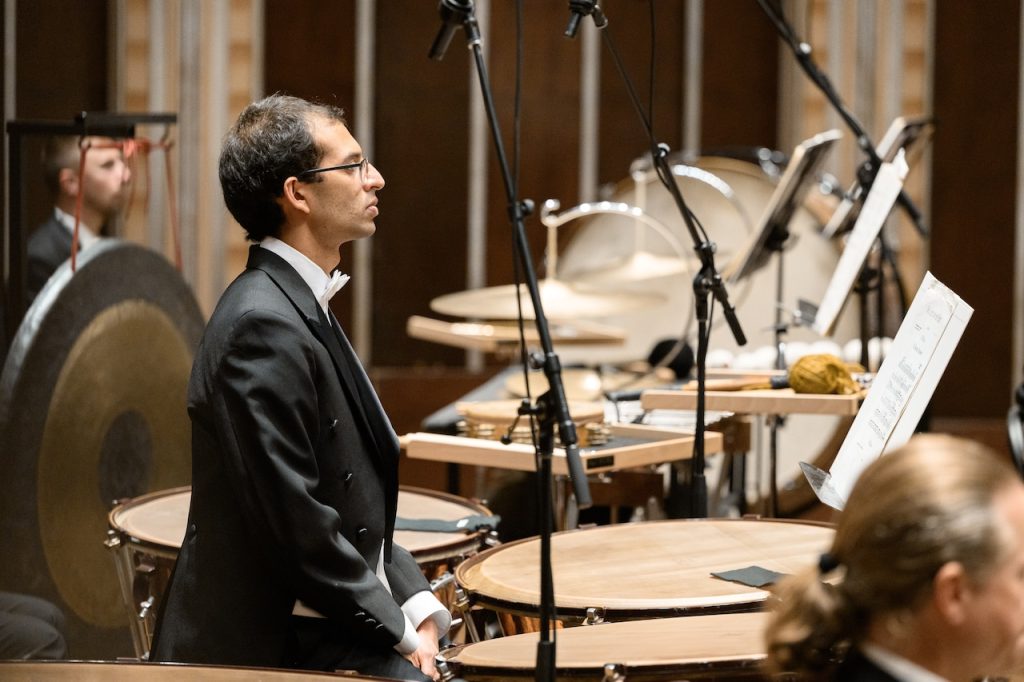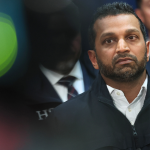CLEVELAND, Ohio – The implement in Zubin Hathi’s hand when he was born wasn’t a drumstick or mallet. It was a tennis racket.
The son of a tennis pro and tennis shop owner — and a skilled tennis player himself — Hathi spent many years growing up in Roanoke, Va. imagining he was headed for the courts, not the world’s great concert halls.
The latter, though, is where he ended up, and where he appears destined to stay. The new principal timpanist of the Cleveland Orchestra, Hathi has completed the transformation, swapping a potential future on grass or clay for a life at Severance Music Center.
“I never envisioned myself making music my career,” Hathi said in the apartment at One University Circle, where he’s lived since his appointment in May. “But I’m a singularly focused person. Once I pick up something, I pretty much forget about everything else.”
Forgetting about everything else won’t be required in Hathi’s new post. Still, in a chair at the back of the orchestra, from which Hathi said “you can see pretty much everything, all the time,” his singular ability to focus might come in handy.
In the principal seat last occupied by Paul Yancich, who stepped down in 2023 after 42 years, Hathi will play a prominent role in a great deal and wide variety of music, often standing out or providing a foundation in concertos and major symphonies. Sometimes, too, he’s likely to perform as a soloist.
None of that daunts Hathi, in part because one of his teachers was Yancich himself. In his master’s degree studies at the Cleveland Institute of Music, Hathi said Yancich “gave me confidence. He made me believe in myself. It’s so easy in this field to feel small, like the odds are stacked against you, but he makes you feel like the greatest person in the world.”
Neither was Yancich Hathi’s only teacher in Cleveland. Another was Marc Damoulakis, the orchestra’s principal percussionist since 2014 and Hathi’s new colleague. Indeed, it was a “mind-blowing” encounter with Damoulakis that drew Hathi to Cleveland and inspired him to emulate the “really specific system” of training he sensed behind the percussionist’s playing.
Hathi gravitated to percussion — away from tennis, violin, and piano, which he’d also studied for a time — in part because percussionists are always playing something different. Damoulakis, though, exemplified a whole new level of versatility. “His ease with so many instruments, it was something I’d never seen before,” Hathi said.
Hathi, in turn, left a similar impression on Damoulakis. As a student at CIM, where he attended after earning a degree at the Curtis Institute of Music, Hathi was one “his teachers never had to worry about,” Damoulakis said, noting that Hathi’s kind nature, hard work ethic and raw talent all but guaranteed success.
It probably didn’t feel that way to Hathi himself — at least not always.
Although Hathi enjoyed early victories, earning principal positions with the Dubuque Symphony Orchestra and the San Francisco Ballet Orchestra, his first two auditions in Cleveland were unsuccessful. Only on his third attempt, when Hathi was by then a known quantity, did he at last win over music director Franz Welser-Most.
“Having people around me wishing me well, it was good for my mental state,” Hathi said, recalling that after he learned he’d won, “I kind of short-circuited there for a few minutes. Never in my wildest dreams would I have imagined this is the job I would get.”
Looking back, there were likely signs, even during his tennis days, that Hathi was a musician at heart, and perhaps a timpanist in particular. A close observer might even have detected a leaning toward Cleveland.
Studying percussion, with its myriad instruments, Hathi always gravitated to the timpani. Seated amid a semicircle of tuned kettledrums, “I felt like I could execute difficult music more naturally, and my instincts for playing in an ensemble were better,” Hathi said.
By then, too, Hathi was already a fan of the famed “Cleveland sound,” and specifically, of its timpani section. Listening to recordings of the orchestra, the full-bodied or exceptionally delicate work of Yancich and his predecessors “always spoke to me, even when I was a younger kid,” Hathi said.
Now Hathi himself is the one making that sound, a model to the next generation of timpanists. Realizing this, Hathi’s parents are “still kind of pinching themselves.” Tennis, meanwhile, has fallen almost completely by the wayside, replaced by running, hiking and rock climbing.
Not that he needs any other hobbies or pursuits. Now that he’s in the Cleveland Orchestra, music alone is enough.
No matter if a piece is brand-new or a warhorse, one he’s never seen or played a thousand times, “It’s never the same thing twice,” Hathi said. “Whatever is in front of me is my favorite thing.”
The Cleveland Orchestra’s next concert is its “Halloween Spooktacular,” 1 p.m. & 4 p.m. Oct. 19 at Severance Music Center, 11001 Euclid Ave., Cleveland. Tickets, $19-$33, are available at clevelandorchestra.com
If you purchase a product or register for an account through a link on our site, we may receive compensation. By using this site, you consent to our User Agreement and agree that your clicks, interactions, and personal information may be collected, recorded, and/or stored by us and social media and other third-party partners in accordance with our Privacy Policy.










